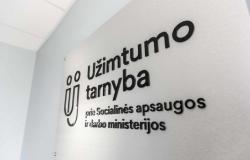
“In Lithuania, babies are not screened for immunodeficiency, which is very unfortunate and we hope that the situation will improve in the future. In principle, it would be possible to diagnose cellular or combined immunodeficiencies immediately after birth,” Edita Gasiūnienė, head of the Primary Immunodeficiency Center of Kaunas Clinics, said at a press conference held on Wednesday.
VIDEO: Primary immunodeficiencies – doom or opportunity?
According to her, if a bone marrow transplant is performed before the child has had the first infections, but after a genetic defect has been detected, in principle the child is healthy and can live a completely normal life.
“When the first infections start (…) the organs are also damaged, and after the transplantation there are residual effects after the infections, which no longer provide such a good quality of life,” said the doctor.
“Therefore, we would strongly encourage the introduction of baby screening for this disease in the future,” added E. Gasiūnienė.
She noted that it is normal for preschoolers to have uncomplicated upper respiratory tract infections, which do not require antibiotics, up to 7-8 times a year. For an adult – 2-3 times a year.
Importance of family doctors and blood donation
According to Laura Malinauskienė, a doctor at the Pulmonology and Allergology Center of Vilnius University (VU) Hospital Santaras, since the symptoms of immunodeficiency are varied, it is not easy to recognize the disease and its diagnosis usually takes several years.
“That’s why the role of the family doctor is very important, because he sees the whole life of a person, all the diseases they had, how often they needed antibiotics, what unusual infections they had. And he could be the first (…) to realize that there is something more than just simple diseases, and send that person to a specialist,” said L. Malinauskienė.
According to her, the vigilance of medical specialists and family doctors should be increased if something is unusual, the patient often has other diseases that are difficult to treat.
“It is very important to be a donor, because blood products are used to make medicines for people with immunodeficiency. (…) Sometimes other drugs are needed that regulate complex mechanisms in immune cells, and it is really possible to help those people”, emphasized the doctor.
Several hundred cases have been identified in immunodeficiency centers
The primary immunodeficiency centers in Lithuania are established in the clinics of LSMU Kaunas and the clinics of VU Santaras. According to E. Gasiūnienė, the Klaipėda University Hospital could also perform the initial examination of the disease.
“Immune deficiency patients are usually seen by family doctors, but in daily practice we usually see them from ear, nose, throat specialists, pulmonologists and gastroenterologists,” she said.
Primary immunodeficiencies are rare in one in 2 thousand people. people or rarer diseases, except for selective immunoglobulin A deficiency, which is diagnosed in 1 in 300 people.
According to doctors, not all immunodeficiencies are diagnosed in Lithuania, in total, since the establishment of the aforementioned centers, the disease has been diagnosed in about 300 people.
Laurynas Ramanauskas, who is suffering from primary immunodeficiency, urges those who have heard this diagnosis to join the activities of the Lithuanian primary immunodeficiency society “Imunas”, the purpose of the organization is to provide psychological support and information to people with immunodeficiency.
A board member of the society noted that it is possible to live a completely normal life with this disease.
“Ten years ago, an additional drug appeared that I can inject myself into the subcutaneous tissue every week. No more hospitalization. In ten years, I was in the hospital about 100 times one day at a time, now I am a very rare guest there,” he said.
According to the Kaunas clinics, the risk of primary immunodeficiency arises in a person of any age who often has recurring or persistent infections. The main symptom of this disease is increased susceptibility to infections, especially of the respiratory tract.
The disease can be signaled by more than one case of pneumonia, two or more ear infections, two or more sinus infections in a year, chronic diarrhea with weight loss, repeated viral infections, repeated deep abscesses of the skin or other organs.
Also, intravenous antibiotics are repeatedly needed for effective treatment of the infection, repeated fungal infection in the mouth, on the skin or other organs, a relative with primary immunodeficiency in the family.
In children, the frequency of infections may be higher, their primary immunodeficiency may be betrayed by insufficient weight gain or stunted growth.
Tags: Doctors call introduction screening babies immunodeficiency stressing importance family doctors
-




